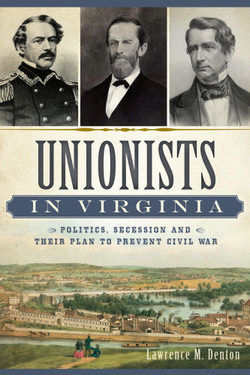
Lawrence M. Denton
The History Press, 2014, 220 pp., $21.99
ISBN: 978-1-62619-745-9
Image courtesy of appalachianhistory.net
The premise of this book is quite interesting in that the state which bore the brunt of the war also bore much of the prevention abilities of the war. Lawrence M. Denton argues that much of this argument began shortly after the surrender of Lee’s forces at Appomattox. Civil War prevention is still a study which goes on today and this work shows the breadth of abilities these men from Virginia to help in the cause of Civil War prevention. Though it was technically a failure, the works of these men and women should not be looked over. Denton shows us that not only are their abilities important to the study of the war, but some should be celebrated for their efforts.
Lawrence M. Denton is an authority on the secession crisis and is a direct descendant of many Maryland families who have been in this country before the American Revolution. He has a Masters degree with honors from Johns Hopkins University where his career would lead him to be the dean of the school. He also held many academic administrative positions from 1968 to 1978. In 1978, he became the special assistant to the associate administrator of the NOAA, a presidential appointee. He is also the author of A Southern Star for Maryland: Maryland and the Secession Crisis and William Henry Seward and the Secession Crisis: The Effort to Prevent Civil War.
Throughout the text in this work, Denton proves that just because a majority of the action in the Civil War occurred in Virginia does not mean that there was a good amount of preventative actions taking place in Virginia. The subject presented in this book is supplemented with many types of tables and exhaustive research. The book is sectionalized to help the readers understand the argument and devotes an entire chapter to Election of 1860. This part of the work was one of the sections which I found to be the most interesting as Denton shows the statistics of the election. While there was no surprise that Lincoln was the last in the polls, the surprise for me came that the numbers were almost neck and neck between Bell and Breckenridge. There was also a general idea that Lincoln won the election due to the immigration vote, but Douglas carried the Valley vote which housed many Germans in Virginia. As the narrative continued and the firing of Fort Sumter came closer and closer, the great amount of soldiers who would later fight for the Confederacy were staunch supporters of Unionism. What this book proves more than anything else, at least for me, was the ideals of defending Virginia during the Civil War.
I highly recommend this book and consider it one of the best researched and well written works of the year. This study adds a great amount of detail and knowledge into the subject of Civil War academia and through the exhaustive research which Denton has provided, this work shines as a testament to the Unionism in the state of Virginia. I not only highly recommend this book to anyone interested in politics of the Civil War, but I highly recommend this book to anyone interested in the Civil War. In these pages they will discover a new knowledge of the secession movement not yet written about and Denton should be praised for what has been presented here.
 RSS Feed
RSS Feed
